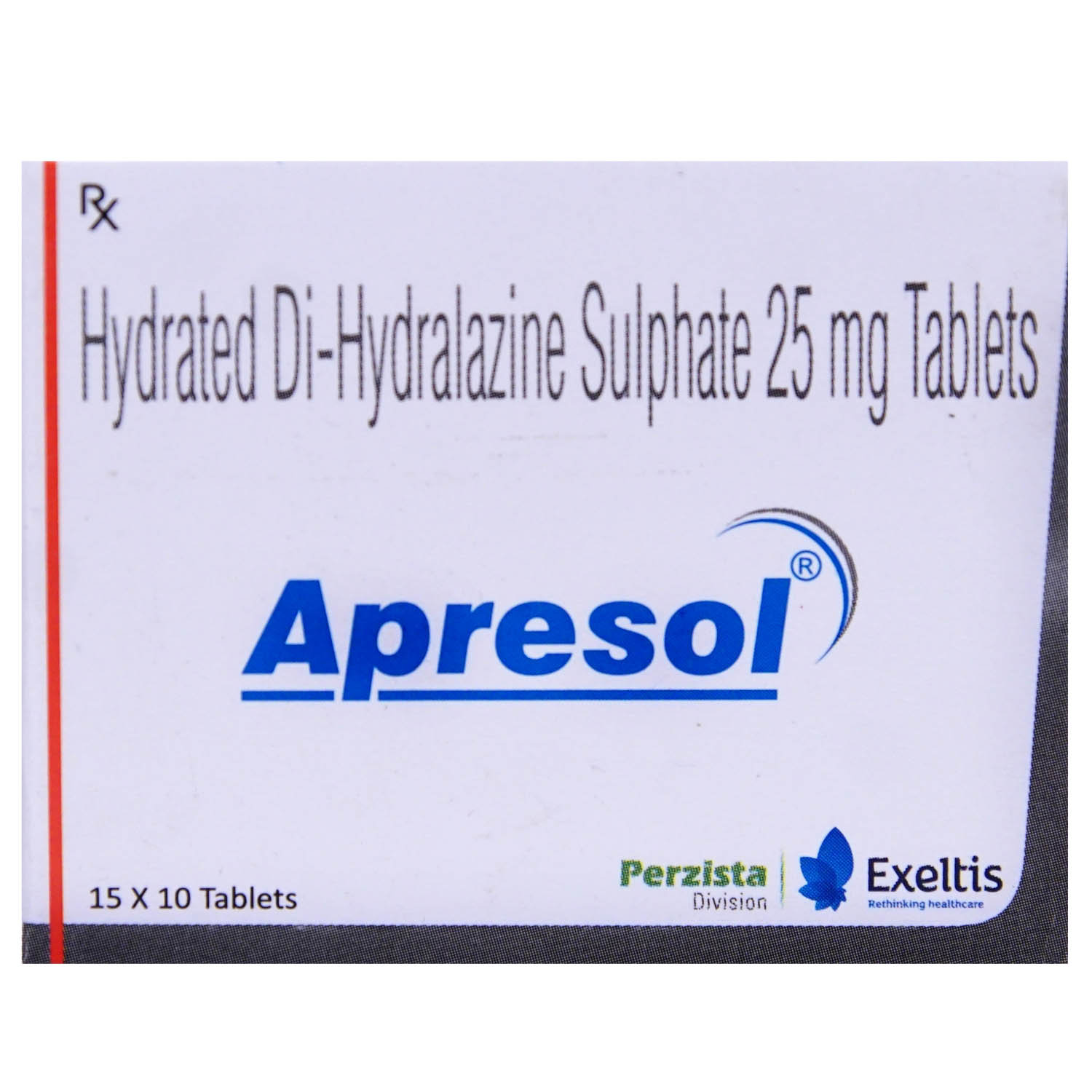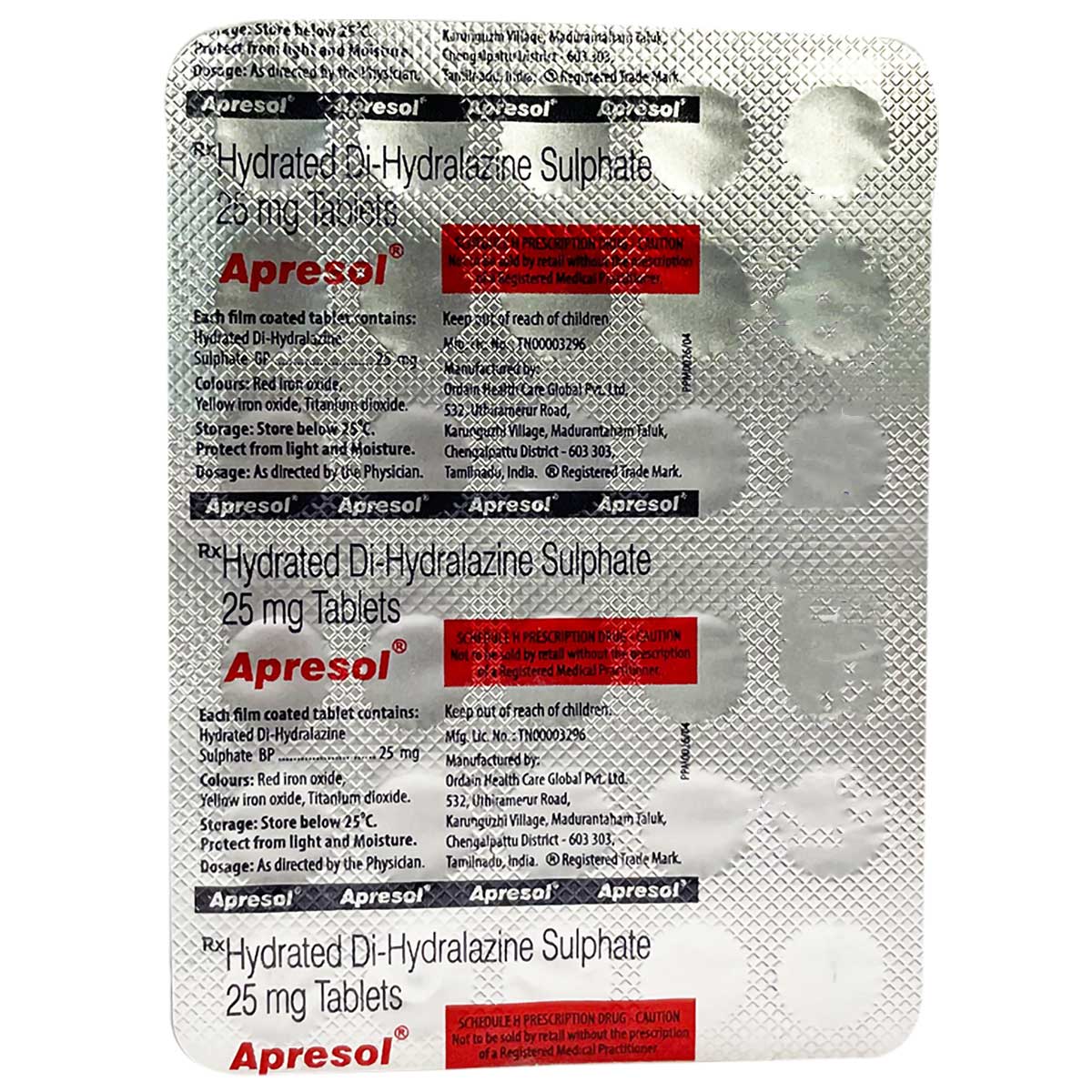Dihydralazine
About Dihydralazine
Dihydralazine is used to treat high blood pressure (hypertension). Hypertension is a chronic condition in which the pressure in your blood vessels is too high.
Dihydralazine contains Dihydralazine, which relaxes blood vessels. This helps improve blood flow and lowers blood pressure.
Dihydralazine may cause side effects like dizziness, headache, gastrointestinal disturbances, flushing, and palpitations. Most of these side effects may not require medical attention and will resolve over time. However, if the side effects persist or worsen, consult your doctor.
Do not take Dihydralazine if you are allergic to any of its components. Consult your doctor if you are pregnant or breastfeeding. Keep your doctor informed about your health condition and medications to prevent any interactions.
Uses of Dihydralazine
Medicinal Benefits
- Dihydralazine helps lower high blood pressure (hypertension).
- It relaxes and widens blood vessels, promoting smoother blood flow.
- It improves the supply of oxygen and blood to different parts of the body.
- By lowering blood pressure, Dihydralazine reduces the risk of stroke and heart attack.
- Dihydralazine protects the heart by reducing strain on the cardiovascular system.
- It supports overall heart and blood vessel health.
Directions for Use
- Dihydralazine can be taken with or without food, as advised by your doctor.
- Your doctor will determine the appropriate dosage and timing of Dihydralazine based on your medical condition and response to treatment.
- Swallow Dihydralazine as a whole with a glass of water.
- Do not crush, chew, or break it.
Storage
Side Effects of Dihydralazine
- Dizziness
- Headache
- Gastrointestinal disturbances
- Palpitations
- Flushing
Drug Warnings
- Do not take Dihydralazine if you are allergic to any of its components.
- Inform your doctor if you have heart failure, porphyria (a blood disorder), heart/kidney/liver problems, or irregular heartbeat.
- Consult your doctor if you are pregnant or breastfeeding.
- Dihydralazine is not recommended in children, as its safety and efficacy have not been established.
- Let your doctor know if you are taking any other medicines, including supplements or herbal products.
Drug Interactions
Drug-Drug Interaction: Inform your doctor if you are taking antidiabetic (diazoxide), an antidepressant (isocarboxazid, tranylcypromine), an antibiotic (phenelzine, linezolid), a dye (methylene blue injection), or an antiparkinsonian (rasagiline, selegiline).
Drug-Food Interaction: Avoid consuming grapefruit during treatment with Dihydralazine.
Drug-Disease Interaction: Inform your doctor if you have bone marrow suppression (a decrease in bone marrow activity resulting in reduced production of blood cells), valve heart disease (a defect in one of the four heart valves), coronary artery disease, cerebral vasculopathy (inflammation of the blood vessel wall), lupus disease (an autoimmune disease), and kidney dysfunction.
Drug-Drug Interactions Checker List:
Safety Advice

Alcohol
unsafeYou are recommended not to consume alcohol along with Dihydralazine to avoid excessive dizziness.

Pregnancy
cautionDihydralazine is a category C pregnancy drug. Dihydralazine is not recommended during pregnancy unless your doctor considers it essential. Your doctor will weigh the benefits and any potential risks before prescribing it to you.

Breast Feeding
cautionTake Dihydralazine only when prescribed. It is known to pass on in a limited quantity via breast milk to the child. Your doctor will weigh the benefits and any potential risks before prescribing it to you.

Driving
cautionDihydralazine may cause dizziness. Drive or operate machinery only if you are alert.

Liver
cautionDihydralazine should be taken with caution, especially if you have a history of Liver diseases/conditions. Your doctor may have to adjust the dose.

Kidney
cautionDihydralazine should be taken with caution, especially if you have a history of Kidney diseases/conditions. Your doctor may have to adjust the dose.

Children
unsafeThe safety and efficacy of Dihydralazine in children have not been established. Dihydralazine is not recommended for children.
Habit Forming
Diet & Lifestyle Advise
- Keep your weight under control with a BMI of 19.5-24.9.
- Regular physical activity or exercise for at least 150 minutes per week, or about 30 minutes most days of the week, can help lower your raised blood pressure by about 5 mm of Hg.
- Option for a diet rich in whole grains, fruits, veggies and low-fat dairy products.
- Limiting sodium chloride (table salt) intake to 2300 mg per day or less than 1500 mg is ideal for most adults.
- If you are taking alcohol, then only one serving for women and two servings for men is advisable.
- Quitting smoking is the best strategy to lower the risk of heart disease.
- Avoid chronic stress, as it can raise your blood pressure. Try to enjoy and spend time with your loved ones to cope with stress and practice mindfulness techniques.
- Try to include heart-healthy, omega-3 fatty acid-containing food drinks in your daily diet. You can also use low-fat cooking oil like olive oil, soybean oil, canola oil, and coconut oil, which can help in lowering your elevated blood pressure.
Special Advise
Monitor your blood pressure daily, and if there is too much fluctuation, then immediately contact your doctor.
Patients Concern
Disease/Condition Glossary
High blood pressure: Hypertension is a chronic condition in which blood pressure and the workload of the heart are too high. This condition can lead to hardened arteries (blood vessels), decreasing the blood and oxygen flow to the heart. Raised blood pressure can cause chest pain (angina) and a heart attack (when the blood supply to the heart is blocked). Additionally, high blood pressure also causes brain damage (stroke) and kidney failure.
FAQs
Dihydralazine is used to treat high blood pressure (hypertension).
No, it is a prescribed drug given by a physician to treat hypertension. Taking it on your own can cause unwanted side effects.
Dihydralazine is a vasodilator or antihypertensive used to treat high blood pressure. It works by relaxing the blood vessels so that blood can flow more easily through the body.
Dihydralazine should not be used if you are allergic to it or if you have coronary artery disease or congestive heart failure.
The typical dosage of Dihydralazine varies depending on your condition, age, and other factors. It's crucial to follow your doctor's specific instructions. They will determine the appropriate dosage and frequency based on your needs.
The safety and efficacy of Dihydralazine in children have not been established, so it is not recommended for them.
Dihydralazine is a vasodilator. It is used to treat high blood pressure.
If you suddenly quit taking it. This can result in uncontrolled high blood pressure. This can increase your risk of developing heart problems, such as chest pain or a heart attack. If you need to discontinue taking this drug, consult your doctor. Your doctor may gradually reduce your dose over two weeks.
The BP-lowering effect can occur in 20–30 minutes following oral administration.
You must continue to take it as directed if you expect to lower your blood pressure and keep it down. You may have to take high blood pressure medicine for the rest of your life. If high blood pressure is not treated, it can cause serious problems such as heart failure, blood vessel disease, stroke, or kidney disease.
If you or someone else has taken too much hydralazine, get medical help right away. Overdose symptoms may include warmth, headache, and redness of the face, neck, arms, and occasionally, upper chest.
Before taking Dihydralazine, tell your doctor if you also use aspirin. Taking aspirin while on hydralazine may increase the risk of dizziness, headaches, or blurry vision. Ask your doctor for advice.
Dihydralazine may not be safe for everyone. Tell your doctor about all your medical conditions and medications.
Dihydralazine can sometimes affect your sex life. Some people may experience reduced sex drive or difficulty achieving or maintaining an erection. If you're having sexual problems while taking hydralazine, talk to your doctor.
Yes, Dihydralazine can normally be consumed with food. This may help to alleviate stomach distress, a typical adverse effect. However, it is critical to follow your doctor's precise instructions, as they may advise taking it on an empty stomach or with a specific type of meal.
While rare, serious side effects of Dihydralazine can occur. These include rapid heartbeat or chest pain, severe allergic reactions, joint or muscle pain, fluid retention or swelling, severe weakness, fever and numbness or tingling in the hands or feet. If you experience any of these symptoms, seek immediate medical attention.
Dihydralazine may interact with other medications, including other blood pressure medications, diuretics, antidepressants, and over-the-counter pain relievers. Always inform your doctor about all your medications, including over-the-counter and herbal supplements.
Dihydralazine is an acceptable antihypertensive medication in nursing mothers, even those nursing newborns. But it should be taken only if prescribed by the doctor.
Take the missed dose as soon as you remember unless it's almost time for your next dose. In this case, skip the missed dose and take your next dose at the regular time. Never take a double dose to make up for a missed one.
Common side effects of Dihydralazine may include abnormal heartbeat, headaches, dizziness, and flushing. These side effects are usually mild and short-lived. However, if the side effects persist, contact your doctor.
Store in a cool and dry place away from sunlight. Keep Dihydralazine out of the sight and reach of children.
Dihydralazine may cause dizziness or lightheadedness, affecting your driving ability. If you experience these side effects, avoid driving until they subside.
Dihydralazine may affect blood sugar levels in people with diabetes. If you have diabetes, it is important to monitor your blood sugar levels closely while taking this medication.





